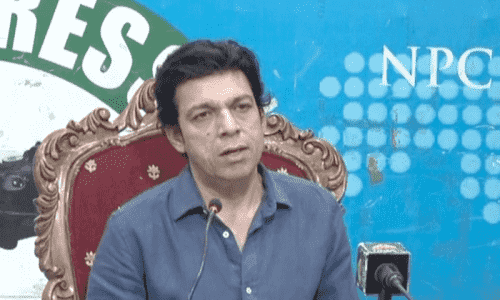On Friday, during the hearing of a suo motu lawsuit based on independent Senator Faisal Vawda’s anti-judiciary remarks, the Supreme Court requested information from the news conference.
The hearings were presided over by a three-judge panel that included Chief Justice Qazi Faez Isa, Justice Irfan Saadat Khan, and Justice Naeem Akhtar Afghan.
Two senators, Vawda and Talal Chaudhry of the PML-N, conducted separate press conferences on Wednesday to challenge the assertions made by the justices of the Islamabad High Court (IHC) that intelligence agencies had meddled in legal matters. They said that nobody has the right to accuse the institutions in the absence of proof.
Six of the eight IHC judges, out of total, shockingly signed a letter to the Supreme Judicial Council (SJC) in late March, denouncing attempts to intimidate judges by kidnapping and torturing their relatives and by secretly spying on them in their homes.
In the meantime, Justice Babar Sattar had stated in a reported letter to IHC Chief Justice Aamer Farooq this week regarding the compromise of his family’s private information that he had sent notices to pertinent ministries as well as the heads of intelligence and investigative agencies during the hearing of the audio leaks case.
According to Senator Vawda, the trend of attacking institutions needs to end. He had questioned Justice Sattar’s decision to speak up “one year after the alleged interference,” saying the IHC judges ought to provide evidence if they had any. “We’ll be there for you.”
Vawda further stated that he had asked the IHC for the specifics of the correspondence between Justice Sattar and then-chief justice Athar Minallah regarding the latter’s US green card, asserting that he had not received the necessary information despite a period of fifteen days. The senator asked the SJC to consider the issue.
Chaudhry stated at his press conference that a judge never sends a letter—instead, he issues notice of any interference.
It should be noted that on Tuesday, May 14, the IHC registrar’s office responded to Vawda. According to Additional Registrar Ijaz Ahmed, the qualifications for a judge’s appointment to the high court do not contain information about citizenship or place of residence.
“The conversation between potential candidates for appointment as judge or/and an interview with the Hon’ble Chief Justice and/or senior puisne judge of high court is not a communication of which record is maintained and minutes taken,” the extra registrar wrote in a letter to Vawda.
According to the letter, the JCP’s consideration of Justice Sattar’s green card was not documented in writing with the IHC.
Interestingly, due to his dual nationality, senior attorney Anis Jilani’s nomination for the position of IHC judge was denied by the Judicial Commission of Pakistan (JCP) in 2013.








